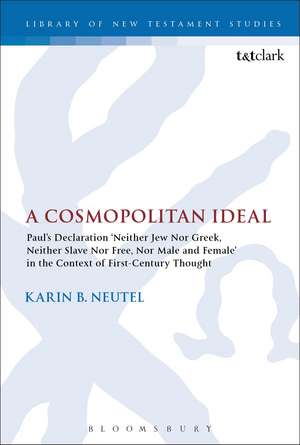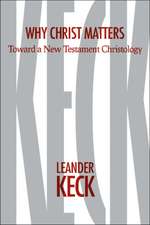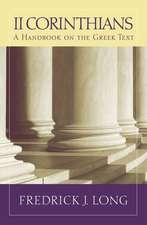A Cosmopolitan Ideal: Paul's Declaration 'Neither Jew Nor Greek, Neither Slave Nor Free, Nor Male and Female' in the Context of First-Century Thought: The Library of New Testament Studies
Autor Karin B. Neutelen Limba Engleză Paperback – 24 aug 2016
| Toate formatele și edițiile | Preț | Express |
|---|---|---|
| Paperback (1) | 258.15 lei 6-8 săpt. | |
| Bloomsbury Publishing – 24 aug 2016 | 258.15 lei 6-8 săpt. | |
| Hardback (1) | 775.02 lei 6-8 săpt. | |
| Bloomsbury Publishing – 25 feb 2015 | 775.02 lei 6-8 săpt. |
Din seria The Library of New Testament Studies
- 34%
 Preț: 509.52 lei
Preț: 509.52 lei - 22%
 Preț: 832.58 lei
Preț: 832.58 lei - 22%
 Preț: 832.09 lei
Preț: 832.09 lei - 24%
 Preț: 190.33 lei
Preț: 190.33 lei - 22%
 Preț: 832.65 lei
Preț: 832.65 lei - 23%
 Preț: 191.31 lei
Preț: 191.31 lei -
 Preț: 221.70 lei
Preț: 221.70 lei -
 Preț: 98.92 lei
Preț: 98.92 lei - 31%
 Preț: 830.87 lei
Preț: 830.87 lei - 22%
 Preț: 834.60 lei
Preț: 834.60 lei - 22%
 Preț: 831.59 lei
Preț: 831.59 lei - 30%
 Preț: 717.05 lei
Preț: 717.05 lei - 22%
 Preț: 835.03 lei
Preț: 835.03 lei - 30%
 Preț: 511.40 lei
Preț: 511.40 lei - 24%
 Preț: 190.33 lei
Preț: 190.33 lei -
 Preț: 158.77 lei
Preț: 158.77 lei - 30%
 Preț: 510.04 lei
Preț: 510.04 lei - 22%
 Preț: 832.99 lei
Preț: 832.99 lei - 30%
 Preț: 509.52 lei
Preț: 509.52 lei - 22%
 Preț: 832.80 lei
Preț: 832.80 lei - 22%
 Preț: 831.76 lei
Preț: 831.76 lei - 22%
 Preț: 834.93 lei
Preț: 834.93 lei - 22%
 Preț: 831.59 lei
Preț: 831.59 lei - 22%
 Preț: 832.41 lei
Preț: 832.41 lei - 22%
 Preț: 832.99 lei
Preț: 832.99 lei -
 Preț: 414.71 lei
Preț: 414.71 lei - 30%
 Preț: 773.65 lei
Preț: 773.65 lei - 22%
 Preț: 834.93 lei
Preț: 834.93 lei - 14%
 Preț: 511.81 lei
Preț: 511.81 lei -
 Preț: 222.16 lei
Preț: 222.16 lei - 30%
 Preț: 775.67 lei
Preț: 775.67 lei - 30%
 Preț: 1012.49 lei
Preț: 1012.49 lei - 30%
 Preț: 509.02 lei
Preț: 509.02 lei - 30%
 Preț: 656.90 lei
Preț: 656.90 lei -
 Preț: 469.92 lei
Preț: 469.92 lei -
 Preț: 471.68 lei
Preț: 471.68 lei -
 Preț: 173.21 lei
Preț: 173.21 lei - 30%
 Preț: 833.64 lei
Preț: 833.64 lei - 22%
 Preț: 834.93 lei
Preț: 834.93 lei - 31%
 Preț: 772.17 lei
Preț: 772.17 lei - 30%
 Preț: 774.20 lei
Preț: 774.20 lei - 14%
 Preț: 1124.92 lei
Preț: 1124.92 lei - 22%
 Preț: 948.51 lei
Preț: 948.51 lei - 14%
 Preț: 1128.84 lei
Preț: 1128.84 lei - 31%
 Preț: 1065.91 lei
Preț: 1065.91 lei - 22%
 Preț: 777.71 lei
Preț: 777.71 lei - 31%
 Preț: 1064.84 lei
Preț: 1064.84 lei - 22%
 Preț: 1063.44 lei
Preț: 1063.44 lei - 22%
 Preț: 889.49 lei
Preț: 889.49 lei - 22%
 Preț: 1006.06 lei
Preț: 1006.06 lei
Preț: 258.15 lei
Preț vechi: 331.54 lei
-22% Nou
Puncte Express: 387
Preț estimativ în valută:
49.40€ • 52.82$ • 41.19£
49.40€ • 52.82$ • 41.19£
Carte tipărită la comandă
Livrare economică 17 aprilie-01 mai
Preluare comenzi: 021 569.72.76
Specificații
ISBN-13: 9780567671929
ISBN-10: 0567671925
Pagini: 280
Dimensiuni: 156 x 234 x 20 mm
Greutate: 0.4 kg
Ediția:NIPPOD
Editura: Bloomsbury Publishing
Colecția T&T Clark
Seria The Library of New Testament Studies
Locul publicării:London, United Kingdom
ISBN-10: 0567671925
Pagini: 280
Dimensiuni: 156 x 234 x 20 mm
Greutate: 0.4 kg
Ediția:NIPPOD
Editura: Bloomsbury Publishing
Colecția T&T Clark
Seria The Library of New Testament Studies
Locul publicării:London, United Kingdom
Caracteristici
Sheds light on the important question of the origins of Christianity
Notă biografică
Karin B. Neutel is Lecturer in New Testament and Early Christianity at the University of Groningen, The Netherlands.
Cuprins
IntroductionPart 1. One in Christ: The Reality of an Ideal CommunityPart 2. Neither Jew nor Greek: Eschatological Gentiles and Jewish CosmopolitanismPart 3 Neither Slave nor Free: Brothers in the LordPart 4. Nor Male and Female: Marriage at the End of the WorldConclusionBibliographyConclusion
Recenzii
Neutel's work as a whole is impressively researched, admirably presented, and faultlessly edited.
Neutel successfully offers a consistent interpretation of Galatians 3:28 in the context of Pauline theology.
.An important study that deserves the attention of students and scholars interested in Paul's social context and its importance for his eschatological framework, specifically as it relates to gender, ethno-racial relations, and class distinctions. It makes an insightful, engaging, and persuasive case, and I highly recommend it.
A welcome contribution to the study of Galatians 3.28 and Pauline theology. Scholars working on this verse and these issues will want to engage with Neutel's contribution.
This study sheds important light on the range of ancient notions of community to which Paul's "one in Christ" can be compared.
It is not easy to justify writing an entire book on a single biblical verse. But even for such a verse, it is not easy to write a book-on-a-single-verse good enough that, after finishing it, the reader regards it as having been well worth the time. Karin Neutel, however, has accomplished both of these difficult feats with A Cosmopolitan Ideal... a revision of a very impressive Groningen PhD thesis."
Neutel's work is characterised by great clarity, stringency and persuasive power ... The work can only be highly recommended, especially in German-language exegesis.
[Neutel] claims that Paul's statement [in Galatians 3:28] has often been studied with regard to contemporary questions; so she will undertake a "thoroughly first century reading: and place the text in its argumentative context" . In a detailed but broad sweeping and well-argued study she makes good on this claim, with results that seem surprising and new in the overworked field of studies of Galatians 3:28.
Neutel successfully offers a consistent interpretation of Galatians 3:28 in the context of Pauline theology.
.An important study that deserves the attention of students and scholars interested in Paul's social context and its importance for his eschatological framework, specifically as it relates to gender, ethno-racial relations, and class distinctions. It makes an insightful, engaging, and persuasive case, and I highly recommend it.
A welcome contribution to the study of Galatians 3.28 and Pauline theology. Scholars working on this verse and these issues will want to engage with Neutel's contribution.
This study sheds important light on the range of ancient notions of community to which Paul's "one in Christ" can be compared.
It is not easy to justify writing an entire book on a single biblical verse. But even for such a verse, it is not easy to write a book-on-a-single-verse good enough that, after finishing it, the reader regards it as having been well worth the time. Karin Neutel, however, has accomplished both of these difficult feats with A Cosmopolitan Ideal... a revision of a very impressive Groningen PhD thesis."
Neutel's work is characterised by great clarity, stringency and persuasive power ... The work can only be highly recommended, especially in German-language exegesis.
[Neutel] claims that Paul's statement [in Galatians 3:28] has often been studied with regard to contemporary questions; so she will undertake a "thoroughly first century reading: and place the text in its argumentative context" . In a detailed but broad sweeping and well-argued study she makes good on this claim, with results that seem surprising and new in the overworked field of studies of Galatians 3:28.















